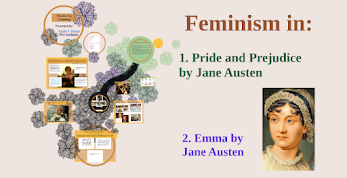- Get link
- X
- Other Apps
- Get link
- X
- Other Apps
Feminism in the Novel Pride and Prejudice by Jane Austen
What is Feminism?
Social Issue
British Society and Feminism
(Nineteenth Century)
Men were seen as superior to women
in nineteenth-century British society. Women are viewed as a second person who lack
in many facets of life, including economics, social interactions, and
education. In that society, men are portrayed as beings who outperform women in
all facets of life. Therefore, discrimination against women is common. This
problem affects women as the next group of people after men. The aforementioned
explanation relates to the quotation that follows.
'I'm
thinking of a novel,' Elizabeth responded. "The cousin's actions hurt my
feelings. Is that what underlies the Vigilante mentality itself?’ (Page:
276).
When Mr Darcy treats Elizabeth
badly, the aforementioned remark describes it. In this circumstance, she is
made fun of, which hurts her. She is not a perfect human, which is why.
Elizabeth believes this makes her like a second person susceptible
to harm and hatred. This claim shows that a guy views a woman as an inferior
being who may be easily damaged and even intimidated. According to the study,
women in British society are viewed as weak in all respects and are
therefore easily injured or frightened by men.
The author of Pride and Prejudice novel portrays Elizabeth, the heroine, as not having the right to pick a husband at the beginning of the book (which means only arranged marriages were at that time and especially focused on the wealthy party for being a couple). Similarly to this, a lady travelling alone is viewed as inappropriate.
Feminist motives Reflected by Pride
and Prejudice
The way that both the original book
and its adaptation portrayed the female characters were examined through the
prism of feminism. It is clear from the analysis of Jane Austen's Pride and
Prejudice that her characters fit in well with modern thought and, more
importantly, gain from the transformation.
It is evident from sociological
methodology. In this instance, Jane Austen attempted to illustrate human nature by having the characters gaze at a beautiful object that brings them joy. In
this book, Jane Austen outlines a civilization that is constantly focused on
money and the pursuit of materialistic existence.
This book also discusses the social
structure or delivery system that uses the English primogeniture system. A
holdover from the feudal system in Normandy is primogeniture. The first male
child is the only one to get an inheritance, with the other boys and girls
going in search of fortune and the kingdom itself being left empty-handed by
its parents. The following exchange illustrates the issue:
Dialogue
between Mrs Bannet and Mr Collins
The
status of women in terms of inheritance is low. They are not eligible for the
legacy right. Primogeniture is an inherited system that causes gender imbalance.
Conclusion
For More Articles Check This...









Comments
Post a Comment